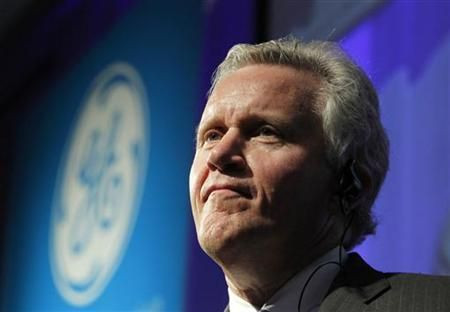GE, Headed By 'Jobs Czar,' Cutting 950 Workers In Pa.

General Electric Co. (NYSE:GE) announced Tuesday it will cut 950 jobs at a unionized locomotive plant in Pennsylvania, wiping out most of the factory’s recent employment growth, as it shifts some production to a lower-cost factory in Texas.
GE’s chairman and CEO, Jeffrey Immelt, happens to be chairman of the president’s Council on Jobs and Competitiveness. He took home $25.8 million in total compensation in 2012 -- a 20 percent jump from the year before.
Reductions at the factory in Erie, which is more than 100 years old, are to start in six months pending 60 days of talks with union officials, who oppose the move, Bloomberg reports. The new plant in Fort Worth is about 20 percent more efficient, said Lorenzo Simonelli, head of GE’s transportation unit. Only 160 jobs will be added there.
“Cost is becoming more and more of a factor,” Simonelli told Bloomberg in an interview. “We’ve got to match our competition and that’s what we’re trying to do.”
He also cited weaker North American locomotive demand due to falling coal prices as the prime cause.
"What we are seeing is a reduced demand outlook in North America from a coal perspective," Simonelli told The Wall Street Journal in an interview. Much of that is caused by a 15 percent drop in coal prices, with customers parking as many as 3,000 locomotives, or about 11 percent of the fleet, he said.
At a time of rising investment in railroads around the country, GE's segment of front-end heavy-haul locomotive power for pulling heavy freight like coal is weakening, Simonelli said. "It just so happens that the segment we are in is under pressure."
GE had expanded its workforce at Erie by about 1,000 in the past two years to 5,500 today as it boosted output of locomotives and mining equipment. The plant in Fort Worth, which employs a fraction of that number, began some production in June and started building locomotives in January.
Transportation and other manufacturing businesses like health care and energy have been a focus of Immelt’s growth strategy for GE. He is shrinking the finance unit after the credit-market turmoil of 2008 jeopardized the company. Industrial sales accounted for more than 65 percent of GE’s $144.8 billion in revenue last year, with $5.6 billion coming from GE Transportation. The Fairfield, Conn.-based company is the world’s largest builder of locomotives.
Simonelli said production of Evolution-series locomotives will be increased in Fort Worth, along with wheels for mining equipment, as output in Erie is reduced. Another 10 percent of the work now handled at the Pennsylvania site will be moved to Mexico and third-party manufacturers, he said.
Approximately 200 of the Erie job cuts, more than 20 percent, are linked to declining coal demand, Simonelli said. GE’s railroad customers have parked about 3,000 locomotives as utilities that once relied on coal carried by trains to produce electricity began switching to cheaper natural gas from shale formations.
“The outlook for the volume on the locomotive side as well as from the coal-mining equipment is down versus what we anticipated,” Simonelli said.
The number of layoffs in Erie may change depending on negotiations with the union, he said. The United Electrical, Radio and Machine Workers of America, which represents about 3,500 GE workers in Erie, is firmly opposed to the move.
“We intend to resist this with every tool at our disposal and to fight tooth and nail to retain all of the work that has always been done there,” Chris Townsend, the union’s political director, said in a telephone interview with Bloomberg.
Since 2011, GE has spent about $140 million upgrading the Erie plant to boost capacity and add research and testing technology. The factory remains the global headquarters for GE Transportation’s locomotive business, and will continue to build locomotives as well as components for the Fort Worth plant and overseas facilities, Simonelli said.
The Fort Worth factory, which began production of mining components in June, is more efficient than Erie based on “a number of different attributes,” he said, including the plant’s layout and workforce rules. GE plans to boost employment there to 550 over the next 18 months from 330 now. That the Fort Worth plant is nonunion wasn’t a factor in the decision to cut jobs in Erie, Simonelli asserted. Texas, a right-to-work state, forbids requiring union membership as a condition of employment.
A global slump in orders for mining equipment has hit GE's competitors, too. Caterpillar Inc., (NYSE:CAT) the world's biggest maker of construction and mining equipment, has been laying off workers at various plants around the world. The company last week said it would eliminate more than 460 workers at a mining-equipment plant in Decatur, Ill., the Journal reported.
© Copyright IBTimes 2024. All rights reserved.





















